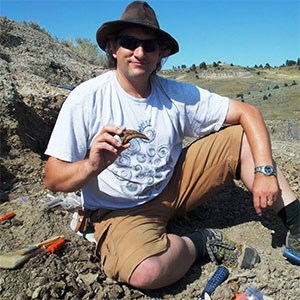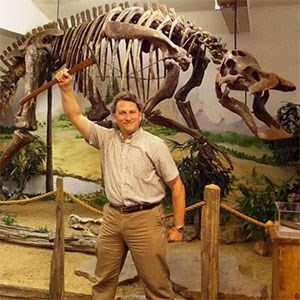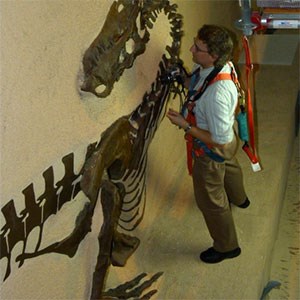Part of a series of articles titled Meet A Paleontologist.
Article
Thomas Holtz, University of Maryland

Senior Lecturer, Vertebrate Paleontology, Department of Geology, University of Maryland
What is your job, and what do you study?
I am a vertebrate paleontologist - a scientist who studies ancient animals with a bony skeleton. More specifically, I am a dinosaur paleontologist who specializes in the anatomy, evolution, and behavior of the carnivorous (meat-eating) dinosaurs, most especially Tyrannosaurus rex and its closest relative.
I am also a Senior Lecturer at the University of Maryland, where I teach paleontology, evolutionary biology, historical geology, and global change science.
On top of that, I write books on paleontology for the general public.

What are you working on now?
Among many other projects, I am investigating the patterns of changing geography on dinosaurian diversity, and on how tyrant dinosaurs like Tyrannosaurus may have changed in behavior throughout their life cycle.
Where did you go to school? What were some of your favorite classes that you took?
I went to public schools in Nassau Bay, TX and Fairfax County, VA. I loved most of my science classes, but also history. I was a college student at Johns Hopkins University in Baltimore, MD, and did my graduate work at Yale University in New Haven, CT. My favorite classes as a college and graduate student were, not surprisingly, about paleontology, evolution, and geology!

Was there an experience you had that made you realize you wanted to be a paleontologist?
I have wanted to be a paleontologist since before I have memory; in other words, I can't remember a time when I didn't want to be one. My parents told me that I first wanted to be a dinosaur when I grew up, but when they said that was impossible I said I would study them instead. Which is what I did!
What is your most memorable experience working with fossils?
Once, on the first day of the field season I was sitting on a hill trying to understand the local geology, then noticed I was sitting among a bunch of fragments of dinosaur eggshell! But in general, whether it is egg, bone, tooth, seashell, leaf, track, or any type of fossil, it is always amazing to think that when you open a rock to see a fossil that you are the first person in the history of the world to see it!
Do you have any advice for aspiring paleontologists?
Read a lot of books about all sorts of natural and scientific subjects, not just about paleontology. In order to make sense of the world you have to understand how it works. But get your nose out of your books when you can, and just explore Nature!
Last updated: July 26, 2018
